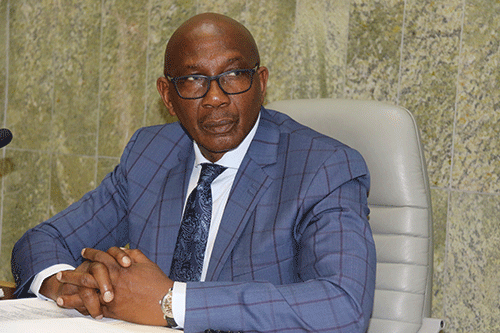Secretary to Cabinet George Simataa said the allocation of N$1.7 billion for the 2024/25 civil servants’ wage increase, despite the existing bloated public wage bill, is “essential” to avoid making them sacrificial lambs.
“We cannot sacrifice the civil servants; they are the machinery of the wellbeing of citizens,” he told the media yesterday after the announcement of the salary increase.
The salary adjustments include a 5% increase in the basic salary for Grades 13 to one, a 20% increase in the housing allowance for non-management staff, a 20% increase in the transport allowance for non-management staff, and an 8% increase in the motor-vehicle allowance (capital and running costs) for management staff. The salary adjustments for the 2024/25 financial year also encompass a flat increase of N$600 per month for Grades 15 and 14, all effective from 1 April 2024.
This joint agreement between the government, Namibia Public Workers Union (Napwu), and the Namibia National Teachers Union (Nantu) came after the civil servants have for the past years been demanding a salary increment.
In February 2021, Napwu and Nantu presented the government with a salary and benefits’ increment proposal for 2021/22.
The unions initially demanded a 10% pay rise across the board, a 25% increase in qualifying amounts for housing subsidies, a 10% increase in transportation for civil servants below management, and a 9% increase in housing allowances.
They were, however, only granted a 3% increment in August last year, which was deemed an “insult” by many.
“The parties remain committed to problem-solving related to conditions of employment of public servants, upholding good public policies and governance, maintaining the wellbeing of all public servants and good labour relations,” reads the joint statement by the government’s negotiating team and recognised trade unions.
Wage bill
The public sector wage bill is projected to take up 39.8% of total budgeted spending.
The government’s total expenditure on the wage bill for public servants currently stands at about N$30 billion, which is about 42% of the total budget. In 2018, the wage bill was about N$30 billion, compared to about N$13 billion in 2013.
To this effect, the government then decided to freeze the recruitment of new staff members, placing leniency on critical positions.
For the fourth quarter of 2021, the wage bill stood at N$6.3 billion after the government agreed to increase public servants’ pay packages by more than N$900 million, following threats of a strike.
The International Monetary Fund (IMF) has advised the government to reconsider its spending patterns, with a significant portion (40%) of the budget being allocated to public wages, leaving limited resources for essential sectors like education and social development.
“We are aware of that factor, and the prime minister has already directed how we can control our wage bill. Some of the measures that were employed are limiting the number of travels, overtime and others, so those measures are still in place,” Simataa noted.
Despite efforts to control the wage bill, he emphasised that civil servants also have families to support, and it is necessary for their salaries to increase due to inflation.
“These are very important people, that is why at Cabinet, it was agreed that they should be given a minimum of 5%. Remember, 5% is below inflation, and this has been going on for a very long time,” Simataa said.
“We need to balance the situation, so careful consideration was made,” he added.
Analysts
Speaking to New Era, economist Omu Kakujaha-Matundu shared Simataa’s sentiments, saying salary increments were expected.
“If you have employees and the inflation rate is going up or the prices for daily services keep going up, then as an employer you must cater for that because your employees will be thrown back into poverty,” he reasoned.
Concerning the wage bill, Kakujaha-Matundu noted that the main point of disagreement revolves around determining the appropriate course of action to sustain it.
“Should we lay off the workers in the public sector? No, it won’t make economic sense because that way, you are going to increase the demand in the economy, and it will suffer a shock,” he said.
The economist added that it will only be reasonable if the economy in other sectors expands and civil servants are absorbed in those sectors, then the number in the public sector can be cut.
“Since we don’t have other viable alternatives in the sectors that can absorb them (civil servants), that N$1.7 billion which we are talking about is also contributing to the economic growth through stimulating more economic activities, and by that it will lead to economic growth, although not sustainable,” Kakujaha-Matundu stated.
– ashikololo@nepc.com.na
Caption:



